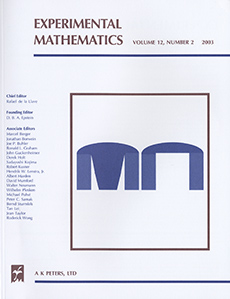Abstract
The asymptotic frequency with which pairs of primes below x differ by some fixed integer is understood heuristically, although not rigorously, through the Hardy-Littlewood k-tuple conjecture. Less is known about the differences of consecutive primes. For all x between 1000 and $10^{12}$, the most common difference between consecutive primes is 6. We present heuristic and empirical evidence that 6 continues as the most common difference (jumping champion) up to about $x=1$.$7427\cdot10^{35}$, where it is replaced by 30. In turn, 30 is eventually displaced by 210, which is then displaced by 2310, and so on. Our heuristic arguments are based on a quantitative form of the Hardy-Littlewood conjecture. The technical difficulties in dealing with consecutive primes are formidable enough that even that strong conjecture does not suffice to produce a rigorous proof about the behavior of jumping champions.
Citation
Andrew Odlyzko. Michael Rubinstein. Marek Wolf. "Jumping champions." Experiment. Math. 8 (2) 107 - 118, 1999.
Information




